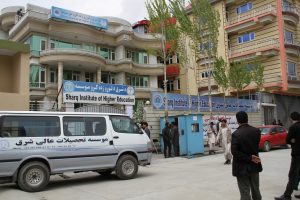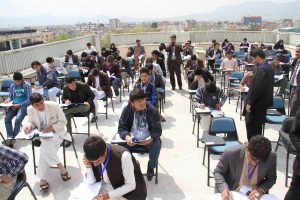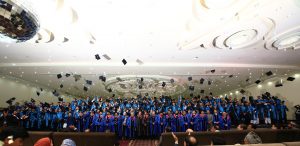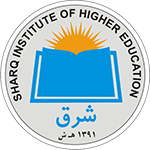History
Sharq Background:
Coordination of Afghan Relief (CoAR) is an Afghan, independent, non-political, non-sectarian, non-profit organization established in 1989 in response to the needs of delivering humanitarian assistance to Afghans in a variety of sectors. In 2010, CEN (Civil Society empowerment network, a group of a number of NGO’s) established an institute by the name of ISDT registered with ministry of education (MoE), w hich offers a two year programs in the field of Business administration, Computer science, as it was not that much effective program. So finally in year 2012 the CEN network decided to enlarge the program to bachelor degree so they started Sharq Institute for Higher Education (SIHE). SIHE is formally registered with the ministry of higher education of Afghanistan, the registration number is 65.
hich offers a two year programs in the field of Business administration, Computer science, as it was not that much effective program. So finally in year 2012 the CEN network decided to enlarge the program to bachelor degree so they started Sharq Institute for Higher Education (SIHE). SIHE is formally registered with the ministry of higher education of Afghanistan, the registration number is 65.
SIHE started its operation in year 2012 with two faculties i.e. Faculty of science and faculty of Economics. Under the umbrella of Science there are two registered department (Computer Science & Disaster Management) and under the umbrella of economic faculty it started its operation in the department of Business Administration. It is a full-fledged and sophisticated institute – in order to extend its outreach to the fellow countrymen in yet another sector. CEN Network has taken this initiative to provide a platform to make the most the incredible tendency of the youth towards higher education and to create a physical environment that supports teaching and learning.
A Snap shot of Sharq Institute of Higher Education:
Sharq Institute of Higher Education has been established under registration number 65 with the Ministry of Higher Education in 2012. It began functioning in two disciplines, science and economics. Science Discipline at Sharq Institute of Higher Education functions in two areas: Bachelor’s in Computer Science (BCS) and Bachelor’s in Disaster Management (BDM). Economics only functions in Bachelor’s in Business Administration (BBA).
Students’ enrollment started in 2013 when 67 students were admitted to above mentioned disciplines. Departments at Sharq Institute of Higher Education were run by only department heads and chancellor, vice chancellor academic and vice chancellor administrators were responsible for overall management and leadership. Moreover, the required infrastructure of Sharq Institute of Higher Education was poor then. Additionally, as students were few in number, most of the faculties were hired on visiting basis.
Sharq Institute of Higher Education had a poor curriculum in its initial stages of functioning as market need had not been observed in it and most of the contents had been poorly designed then.
However, there was a dramatic positive change both in quality and quantity at Sharq Institute of Higher Education in 2014; the change occurred when 481 students joined Sharq Institute of Higher Education. The overall quality also enhanced in 2014 as 3 permanent lecturers were hired for every department and changes were brought in curriculum to fit academic and market demands. Furthermore, text books relevant to discipline were purchased for the library and computer lab was also enriched. What counts important is that Sharq Institute of Higher Education earned 44% of its expenses itself; the remaining expenses were provided by COAR in the aforementioned year.
In 2015 the number of students increased to 688 that shows a 30 percent growth in comparison with year 2014. The growth led to covering 69% percent of Sharq expenses. There was a tangible positive transformation at Sharq Institute of Higher Education. For example, the library was enriched with updated new text books. Furthermore, Sharq Institute of Higher Education signed an MoU (Memorandum of Understanding) with ACKU (Afghanistan Center at Kabul University). ACKU is a digital library at Kabul University that provides around 30,000 e-books, e-journal and e-newspaper articles. As Sharq Institute of Higher Education has affiliation with ACKU, students of Sharq have access to information through ACKU; particularly BDM students gain the utmost benefits of the library. In 2015 Sharq Institute of Higher Education had 8 permanent and 28 part-time lecturers. Among the lecturers 3 of them were lecturers holding doctorate degree; 16 master and 17 bachelor degree holders. Also in 2015 on Environment Protection International Day, SAARC (South Asian Association for Regional Cooperation) held offered a 3 day forum on environment protection. The forum was successfully organized by COAR (Coordination of Afghan Relief) in collaboration with Sharq Institute of Higher Education.
2016 was year of achievement for Sharq Institute of Higher Education. The curriculum was further revised and updated. Also education policy and procedures were improved. Most importantly, the number of students increased to 771 which contributed greatly in the institute’s revenue. Sharq Institute of Higher Education provided 82 percent of its expenses through its own revenue in 2016. Another initiative also took place in 2016 was developing a system called Cloud Computer System (CCS). Lecturers can upload relevant reference books and other academic materials in CCS system, so st udents access the academic materials easily.
udents access the academic materials easily.
2017 was a golden year for Sharq Institute of Higher Education because the number of students reached 943 and around 250 students were graduated from BCS, BBA and BDM. Also the revenue of Sharq Institute of Higher Education increased dramatically that it could cover its 87 percent of its overall expenses. Furthermore, a research center was established in the same year and the students were given the opportunity to do research on different topics.
